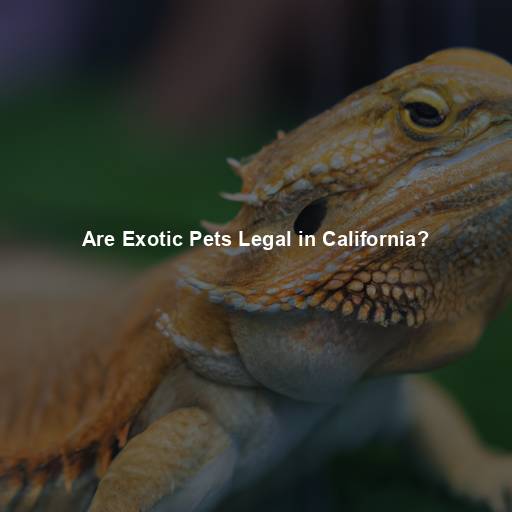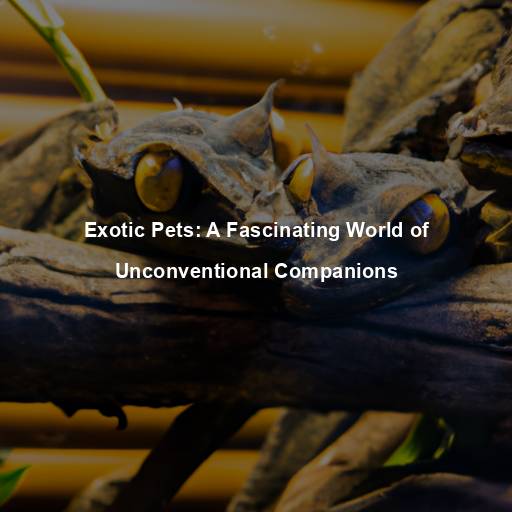Are Exotic Pets Legal in California?
Last Updated on July 13, 2023 by Evan
Contents
- 1
- 2 The California Department of Fish and Wildlife
- 3 Local Ordinances and Municipal Regulations
- 4 Ethical Considerations and Responsible Ownership
- 5 Exotic Pet Ownership and Public Safety
- 6 Exotic Pet Rescue and Rehabilitation
- 7 Exotic Pet Alternatives: Ethical and Responsible Choices
- 8 FAQs: Are Exotic Pets Legal in California?
- 8.1 Are all exotic pets legal to own in California?
- 8.2 What types of exotic pets are prohibited in California?
- 8.3 Are there any exceptions to owning prohibited exotic pets in California?
- 8.4 Can I own smaller exotic pets like reptiles or exotic birds in California?
- 8.5 What are the penalties for owning prohibited exotic pets in California?
- 8.6 Where can I find more information about owning exotic pets in California?
With its awe-inspiring array of wildlife, California has long been a refuge for nature enthusiasts and animal lovers. However, when it comes to the realm of exotic pet ownership, the rules and regulations can be as perplexing as a maze. While the dream of frolicking with a majestic tiger or being awestruck by a mischievous monkey swinging through the trees may ignite our imaginations, it is crucial to navigate the legal landscape surrounding these creatures. In this enlightening article, we embark on an exploration of the intricate webs of laws and restrictions that govern exotic pet ownership in the Golden State, aiming to provide an invaluable guide for those who find themselves enraptured by the allure of these extraordinary animals.
Understanding Exotic Pets
Let’s dive into the intriguing world of exotic pets and unravel the complexities surrounding their legalities. It’s essential to establish a clear understanding of what categorizes an animal as “exotic”. These captivating creatures hail from non-native lands and demand specialized attention. From reptiles and distinctive bird species to primates, big cats, and even insects or arachnids, the realm of exotic pets is a captivating one.
The California Department of Fish and Wildlife
Navigating the complex realm of exotic pet ownership can be a daunting task, but fear not. Enter the California Department of Fish and Wildlife (CDFW), the unsung heroes responsible for safeguarding the state’s diverse wildlife and precious natural resources. With their unwavering commitment to conservation, the CDFW diligently enforces an array of regulations specifically designed to preserve the well-being of both indigenous and foreign creatures that call the Golden State home. So rest assured, fellow animal enthusiasts, for the CDFW has got your back when it comes to keeping the wild in balance.
Prohibited Species
In a world filled with the splendor of nature and the fragility of our ecosystems, it becomes crucial for us to strike a delicate balance between coexistence and safety. To this end, the California Department of Fish and Wildlife (CDFW) has taken up the mantle of protecting both our environment and the public by meticulously curating a list of species that must not be owned as pets within the state. Embodying the duality of wonder and peril, this catalogue includes creatures ranging from mighty bears and majestic wolves to formidable crocodiles and venomous serpents. As the tides of regulations ebb and flow, it becomes imperative to stay knowledgeable by visiting the official CDFW website or reaching out to them directly for the most current and comprehensive list of these enigmatic and forbidden companions.
Permits and Licenses
Navigating the world of exotic pets can be a laden affair filled with complexities and uncertainties. The ever-elusive line between what is permissible under the law and what is not can leave one feeling both intrigued and bewildered. Thankfully, amidst this tapestry of enigmatic regulations, the California Department of Fish and Wildlife (CDFW) emerges as an authoritative entity, issuing permits that hold the key to unlocking the ownership of select exotic species. With these coveted permits in hand, individuals are granted the privilege to create an environment catered to the needs of these unique creatures, ensuring their well-being and the guardians’ aptitude to provide the utmost care.
Applying for a permit to own an exotic pet is no easy feat. Brace yourself for a whirlwind of paperwork, mind-boggling information, and multiple hoops to jump through. Be prepared to prove that you know your stuff about the species you want to adopt, show evidence of a suitable habitat and top-notch veterinary care, and brace yourself for thorough inspections that will scrutinize every little detail. Don’t dive into this process headfirst without diving into extensive research first.
Local Ordinances and Municipal Regulations
When it comes to owning exotic pets, it’s not just state regulations that matter. Local ordinances and municipal regulations play a pivotal role in governing this unique pet ownership. The intricacies of the laws can be mind-boggling as they differ among cities and counties in California. To navigate this perplexing maze, thorough research and understanding of the rules specific to your area are imperative before embarking on the journey of acquiring an exotic pet.
Zoning Restrictions
When it comes to local ordinances, zoning restrictions are like perplexing puzzle pieces that determine where our furry (or not so furry) companions can call home. Bursting with intricacy, these rules outline designated zones where certain critters are welcome and others are left to cast adrift. The aim? To preserve public safety and ward off eyebrow-raising encounters between exotic pets and the local community.
Permitting Process
Owning an exotic pet can be an exhilarating adventure, but it’s important to navigate the often perplexing world of permits and regulations. While federal laws provide a framework, cities and counties throw in their own unique twist. From completing applications to proving you can provide proper care and accommodation, these processes can make your head spin. Oh, and don’t forget the fees and occasional surprise inspection!
Ethical Considerations and Responsible Ownership
Owning an exotic pet goes beyond the legalities – it delves into a complex realm of ethics and responsibilities. These majestic creatures, with their distinct needs and demanding requirements, pose a perplexing challenge for those who choose to have them in a domestic setting. From ensuring proper nourishment to creating an enriching environment, providing impeccable care becomes a paramount obligation to safeguard their well-being.
Specialized Care
Owning an exotic pet can be a thrilling adventure, filled with wonder and fascination. Yet, embarking on this journey requires a level of dedication and knowledge that surpasses the ordinary realm of pet ownership. These captivating creatures come with a tapestry of intricate needs, from the intricate nuances of their diets to the intricacies of their living arrangements. Creating a harmonious habitat for these exotic companions involves deciphering the enigmatic puzzle of temperature and humidity, while at the same time recognizing that this commitment is not a mere fleeting affair – it is a lifelong dance of responsibility and devotion.
Education and Experience
When it comes to having an exotic pet, it’s definitely not a walk in the park. It’s a fascinating but demanding responsibility that calls for a deep well of knowledge and experience. Doing your homework is vital – dive into extensive research about your desired species, master their peculiar behaviors, learn about their unique health needs, and understand the specific environment they thrive in. If you’re serious about this, consider going the extra mile by getting practical experience through volunteering at a wildlife rehab center or connecting with a seasoned expert in the field – they can offer priceless insights into providing the right care.
Conservation Considerations
Exotic pet ownership can have implications for wildlife conservation. Many exotic animals are taken from their natural habitats, contributing to illegal wildlife trade and the decline of wild populations. Before considering an exotic pet, it is essential to explore alternative ways to support conservation efforts, such as donating to reputable organizations or participating in wildlife rehabilitation programs.
Illegal Wildlife Trade
The underground world of the illegal wildlife trade continues to cast a perplexing shadow on the fate of exotic pets. These creatures, ranging from captivating primates to mesmerizing reptiles, fall victim to a disturbing network of capture, smuggling, and demand. With each transaction, the survival of species in their natural habitats hangs in a delicate balance, while inhumane practices haunt the murky corners of this illicit industry.
Supporting Conservation Efforts
Instead of contributing to the exotic pet trade, there are alternative ways to support conservation efforts. Donating to reputable organizations that work towards wildlife conservation can make a significant impact. These organizations focus on habitat restoration, anti-poaching efforts, and education to raise awareness about the importance of protecting endangered species.
Exotic Pet Ownership and Public Safety
One of the main reasons for regulations on exotic pet ownership is public safety. Exotic animals, especially large carnivores or venomous species, can pose a threat to the community if not properly handled and contained.
Escapes and Attacks
In the fascinating realm of exotic pets, tales of unexpected encounters continue to weave a tapestry of bewilderment. While such incidents unveil themselves on rare occasions, the undeniable reality of potential perils looms large. Unpredictable instincts and enigmatic behaviors grant these captivating creatures an elusive charm, but bestowing them with thoughtful guardianship and secure enclosures becomes an imperative mandate.
Zoonotic Diseases
Another concern related to exotic pets is the potential transmission of zoonotic diseases. Some exotic animals, such as certain reptiles or primates, can carry diseases that can be transmitted to humans. These diseases can range from mild illnesses to severe and potentially life-threatening conditions. It is important to practice good hygiene and consult with a veterinarian experienced in exotic animal medicine to minimize the risk of disease transmission.
Exotic Pet Rescue and Rehabilitation
Owning an exotic pet can be alluring and exciting, but sometimes reality proves to be quite different than initially envisioned. These unique creatures may demand an extraordinary level of care, morphing into a perplexing challenge that surpasses our expertise. Furthermore, they often outgrow their living spaces, leaving their owners in a state of bewilderment. Fortunately, exotic pet rescue and rehabilitation organizations come to the rescue, offering a much-needed sanctuary for these remarkable beings where they can thrive in a safe and appropriate habitat.
Rescue and Rehoming
When it comes to our furry friends, we all want what’s best for them, including those with a more exotic taste. That’s where these incredible pet rescue organizations come into play, stepping in to provide a lifeline for animals in need. Their mission? To shower these unique creatures with the love, attention, and medical care they deserve, all while striving to find them the perfect forever home or sanctuary.
Education and Outreach
Exotic pet rescue organizations also play a crucial role in educating the public about the responsibilities and challenges of owning exotic pets. They offer resources, training, and support to potential owners, promoting responsible ownership and discouraging impulsive or uninformed decisions.
Exotic Pet Alternatives: Ethical and Responsible Choices
While the allure of exotic pets may be strong, it is essential to consider alternative options that promote ethical and responsible choices in pet ownership. There are numerous domesticated and hybrid species that make wonderful companions and are well-suited to a domestic environment.
Adopting Shelter Pets
In a world filled with countless opportunities to make a change, perhaps one of the most profound ways to create a positive impact is by extending a helping hand to our furry friends. Unlock the doors of your heart and consider taking the path less traveled: adopting a pet from a shelter or rescue organization. Amidst the infinite array of dogs, cats, and small mammals, you’ll discover a world of captivating stories, waiting for their own chapters to be written. Together, we can break the cycle and reduce the demand for breeding and the often perplexing and baffling exotic pet trade.
Supporting Local Wildlife
If you have a passion for wildlife but want to make a difference on a local level, consider supporting local wildlife conservation efforts. You can create a wildlife-friendly backyard by planting native plants, providing food and water sources, and creating habitats for local birds, butterflies, and other wildlife. Additionally, participating in citizen science programs or volunteering for local wildlife organizations can contribute to conservation efforts.
FAQs: Are Exotic Pets Legal in California?
Are all exotic pets legal to own in California?
California, the land of dreams and aspirations, harbors a myriad of peculiar creatures. However, before indulging in the enchantment of owning an exotic pet, one must navigate the labyrinth of regulations and restrictions laid out by the state. In this intricate dance of legality, it becomes vital to delve into the depths of research and comprehension, unraveling the tapestry of laws that govern the ownership of these extraordinary beings. One must tread carefully, for the key to unlocking the gateway to a whimsical realm lies in understanding the precise regulations that rule over each captivating species that captures our hearts.
What types of exotic pets are prohibited in California?
From the enchanting depths of California’s legislation, emerges a prohibition that has left some animal lovers in a state of bewilderment. As the golden state basks in its majestic allure, a peculiar dance takes place – a delicate balance between protecting the fragile threads of public safety and the wellbeing of bewitching creatures. It is here, amidst the vast expanse of legalities, where the keeping of enchanting lions, awe-inspiring bears, mischievous primates and slithering venomous snakes becomes a forbidden tale. Not to forget the magnificent reptiles, like the regal crocodiles and the awe-inspiring alligators, who find themselves entangled in this perplexing tapestry of regulations.
Are there any exceptions to owning prohibited exotic pets in California?
Keeping exotic animals can be a perplexing endeavor, but there are some exceptions that may burst through the seemingly ironclad regulations. Licensed zoological facilities, research institutions, and accredited sanctuaries might just slip through the cracks and be granted the privilege to house certain prohibited species. However, navigating this maze of exceptions requires specific permits and licenses, making it crucial to consult with the California Department of Fish and Wildlife or local authorities to unravel the enigma surrounding the species you have your heart set on.
Can I own smaller exotic pets like reptiles or exotic birds in California?
Yes, some smaller exotic pets like reptiles (except those specifically prohibited), certain species of birds, and small mammals can be owned in California. However, it is crucial to ensure that you are well-informed about the specific regulations and requirements for each species. Some may require permits or licenses, as well as appropriate housing and care.
What are the penalties for owning prohibited exotic pets in California?
Owning prohibited exotic pets in California can result in severe penalties. Violators may face fines, legal consequences, confiscation of the animal, or even potential harm to the animal’s well-being if found to be kept in unsuitable conditions. It is crucial to comply with the state’s regulations to avoid legal troubles and ensure the welfare of both the public and the animals.
Where can I find more information about owning exotic pets in California?
When it comes to the intricacies of owning exotic pets in California, look no further than the California Department of Fish and Wildlife (CDFW). They are the go-to resource, offering comprehensive and reliable information on ownership regulations. Whether it’s understanding the specific requirements, obtaining permits, or staying updated on recent legal developments, the CDFW is your ultimate destination. So, don’t hesitate to reach out or explore their official website for a wealth of knowledge.






